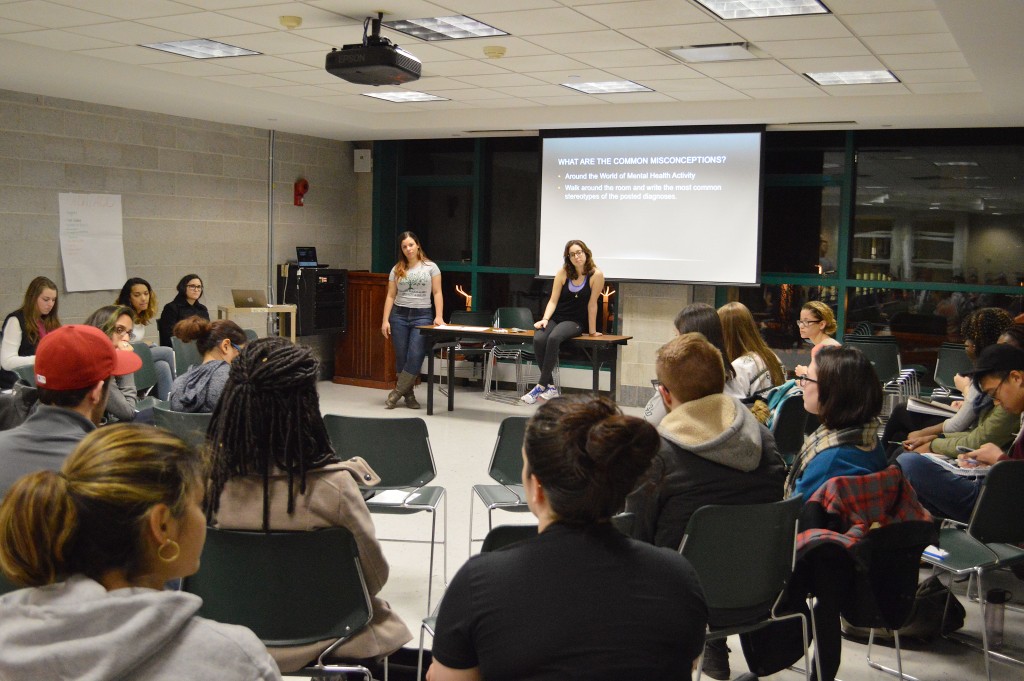
Although some may jokingly call Binghamton’s weather “bipolar” or say their friends are “OCD” for going back to the parking lot to check if they locked their cars, these terms are commonly misused and create mental health stigmas.
Around 30 Binghamton University students gathered in the New University Union on Monday night during a Mental Health Outreach Peer Educators (M-HOPE)-sponsored event called “Mental Health Stigmas” to learn about stigmas commonly and wrongfully associated with certain mental health issues. This event was also the first Mental Health Advocate program of the semester.
Three M-HOPE interns presented a slideshow with different images, definitions and resources for students, which included a clip of Vinny Guadagnino from “Jersey Shore” discussing how he deals with anxiety. Students were asked to write down the first thing that comes to mind when hearing words like “cancer,” “mental illness,” “counseling” and “physical therapy.” Presenters explained that mental health issues are commonly thought of as less important than physical health issues, but they are connected and affect each other.
Hadas Bernstein, an M-HOPE intern and a junior majoring in psychology, said that she tries to incorporate mental health awareness into her daily life by intervening when she hears people using incorrect terms.
“In reality, it’s not a matter of me being politically correct,” Bernstein said. “It’s me being sensitive to the people around me, and that’s really what I hope other people got from this.”
The presenters defined the term “microaggression” as a brief verbal, behavioral or environmental indignity that is a negative insult toward people of a non-dominant identity. The presenters said that people do not realize they use microaggressions because they are embedded in conversations. A common microaggression includes calling skinny people anorexic.
The interns stressed that disorders are not adjectives and encouraged students to use “person-first vocabulary,” meaning that instead of defining people by their mental disorders, they should be referred to as a person with a certain disorder such as “a person with depression” rather than “a depressed person.”
Olga Gonzalez, an M-HOPE intern and a senior majoring in sociology, said that the interns want to make students conscious that their wording affects others around them.
“It’s important for us to discuss stigma because a lot of people go through these things,” Gonzalez said. “It’s not something that just a small amount of the population goes through, but a lot of people don’t talk about it, and they don’t get the help.”
Students were also asked to write the most common stereotypes and misconceptions of ADHD, schizophrenia, anorexia nervosa, bipolar disorder and OCD. They then shared why they wrote such words and shared personal stories disproving the stereotypes, combating such perspectives as those claiming that all depressed people are lazy or anorexics want attention.
Donna Nazarian, a Real Education About College Health (REACH) intern and a freshman majoring in psychology, said that talking about stigmas that exist is just as important as teaching about the disorders.
“As far as learning, I feel we touched upon stuff that maybe we already knew, but the conversation is important to have because just by talking about it openly — I think that as a society we can kind of get over the stigma,” Nazarian said.
The interns stressed that stigmas are problematic because they silence and discourage people from seeking the help they need, as stigmas can induce feelings of worthlessness and may create barriers between people on-campus. Presenters instructed students to show concern for others when they are feeling down, check their own use of language and encourage others to go to the University Counseling Center if needed.


